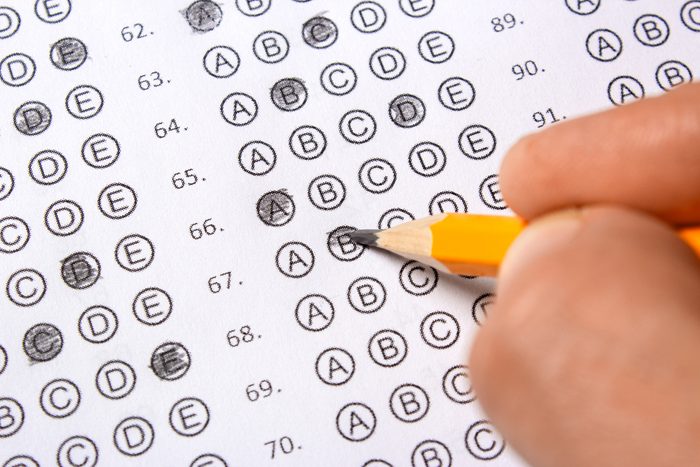
We all knew that kid in school who aced every test. While that person probably was smart, chances are good they were also intelligent.
We tend to think being “smart” and being “intelligent” are the same, but they’re actually two different traits. Some scholars who study the brain, cognition, and intelligence suggest that being smart refers to how much you study or learn, but intelligence is your natural ability to learn. Humans have to work at being smart—but if they’re intelligent, being smart may come easy to them.
If you’ve ever been curious “Am I smart?,” what you were probably wondering was whether you possess a uniquely high level of intelligence. The Healthy @Reader’s Digest spoke with two experts for the answers.
“Am I smart?” Here’s how to measure intelligence
Most psychologists provide psychotherapy services, but some specialize in assessment and evaluation, like Rosemarie Manfredi, PsyD, who practices neuropsychology in Bensalem, PA.
Dr. Manfredi suggests the best way to learn whether you’re smart is to contact one of these psychologists and request an intelligence test. In other words, figuring out if you’re smart typically isn’t a job for a school teacher or your primary care provider.
There are a variety of different tests that measure intelligence quotient—we refer to these as IQ tests. “Typically, intelligence tests measure verbal and nonverbal reasoning and problem-solving,” Dr. Manfredi says. “Some intelligence tests also include measures of working memory … or processing speed.”
Another point to remember: There are different types of intelligence. “While most people’s scores are relatively even across each of these domains, some individuals show a lot of unevenness in their profiles,” says Dr. Manfredi. “In these cases, a single IQ score may not adequately describe the individual’s actual level of functioning.”
In the world of intelligence assessment, generally an IQ score ranging from 90 to 109 is considered average, but that can vary depending on your age. IQ also naturally increases as you get older. And rest assured that easy-breezy old classmate didn’t have all the luck: Just because a person has a high intelligence score doesn’t mean they’ll perform any better under stress. IQ is just one facet of a person, and IQ tests vary.
IQ test aside, you may be able to gauge your intelligence (or the intelligence of others) based on traits and behaviors. Dr. Manfredi and another neuroscience expert say there are a few subtle signs that can hint at high intelligence.
Eating This Berry Can Improve Your Heart & Brain Health in 8 Weeks, New Study Says

1. An open mind
“Medically healthy individuals who have higher intelligence generally tend to be more open to new experiences and ideas,” Joel Frank, PsyD, a psychologist from Sherman Oaks, CA, tells The Healthy. They also are more curious, seeking to understand the mechanisms behind how things work.
A 2016 study that followed more than 5,000 people for about 50 years found that kids with high intelligence continued to be open to new ideas as they grew. Intelligent people thrive on learning, so they’re likely to seek out answers—something that helps their smarts develop continuously.

2. Big-picture thinking
Frank says people with high intelligence are able to think about information differently from than their own perspective, and possibly adjust how they see things. This is a popular psychology term known as “reframing”—trying to see a problem from a different viewpoint to move toward a solution.
The 5 Best Supplements To Preserve Your Brain, From a Doctor of Regenerative Medicine

3. Messy spaces
Not everyone with a high IQ will like their office to be a wreck, but repeated research has shown that people with high intelligence tend to have more cluttered spaces.

4. Staying up late
Research has also correlated high intelligence with being a night owl. That may not be ideal for your physical health or that morning gym commitment, but maybe this explains why you tend to stay awake when the rest of the house or the neighborhood is sleeping soundly.
These 4 Sleep Behaviors Can Help You Live Longer, Says New Research

5. Anxiety
You don’t have to be a nervous nelly to be a brain, but anxiety can be a sign that you have a generous intelligence level. A 2015 report that examined generalized anxiety disorder and depression found that verbal intelligence predicted a greater predisposition to worry or ruminate more.
How Rumination and Obsessive Thoughts Are Linked to Anxiety and Depression

6. A good memory
There are a few different kinds of memory—think short- and long-term memory. Research has shown that if you tend to retain information well, it can be a sign of high intelligence.
Over 40? Here Are 9 Clever Memory Exercises to Start Doing Today

7. Alone-time boundaries
This isn’t to say that you’re a total loner if you have a high intelligence level, but those who do tend to value time alone. A 2016 study found that people with high IQ weren’t as satisfied when they focused on socializing with friends more frequently.
Note that doesn’t mean people with high intelligence just stay home all the time. They’re likely to engage in mentally and physically stimulating activities, Dr. Frank says.

8. Trustworthiness
Some research shows that people with high intelligence may be good judges of how trustworthy others are. As such, they usually choose to surround themselves with people they can trust deeply. (This may be one reason wider socializing isn’t a frequent desire.)

Ready for an IQ test?
These are just a few characteristics that can suggest high intelligence. An intelligence test can be a more definitive way to measure your intelligence.
There are a number of intelligence tests for adults. Dr. Manfredi says some of the most commonly used include the Wechsler Adult Intelligence Scale, the Reynolds Intellectual Assessment Scales, and the Stanford-Binet Intelligence Scales. Dr. Frank says there are shorter tests that a professional can administer that only take about 30 minutes, but a longer testing process can provide greater insight where a neuropsychologist takes metrics for areas like attention, logic and memory and puts them together into the Full Scale Intelligence Quotient, which people generally refer to as the overall IQ.
And finally, recommends Dr. Frank, don’t trust every intelligence test you stumble on to determine whether you’re a smartie. “While there are publicly available online tools for estimating intelligence, it is best to work with a licensed therapist or psychologist … to get an accurate measure,” he says.
